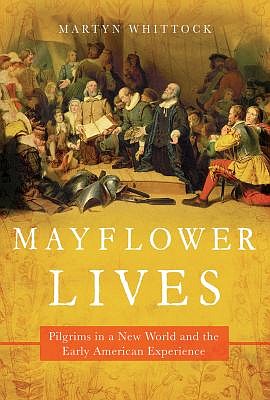In the late autumn of 1620 after a 66-day voyage at sea, the weary passengers of the Mayflower set foot on Plymouth Rock - or did they?
The story of Plymouth Rock is just one of the legends surrounding the landing of the Pilgrims in North America in Martyn Whittock's book "Mayflower Lives: Pilgrims in a New World and the Early American Experience."
Whittock draws together a wide range of individual lives from this momentous voyage, exploring not only the significance of the Mayflower's historical sea journey, but the motives, trials and tribulations of her passengers.
When we think of the Pilgrims, we tend to think of them collectively as a group who came to America in search of religious freedom. Whittock gives us a more personal insight into their lives as individuals with a past, present and future. "Mayflower Lives" examines the life stories of such widely known individuals as Miles Standish, William Bradford, William Brewster and Tisquantum (Squanto), as well as lesser known figures as Stephen Hopkins, father of Oceanus Hopkins, the only child born aboard the Mayflower; Mary Chilton, credited with being the first Pilgrim to place her foot on Plymouth Rock; Richard More and his young sister, 4-year-old Mary More.
"Mayflower Lives" commemorates the 400th anniversary of the Mayflower voyage and landing in North America in 1620. Whittock acknowledges the story of the Pilgrims and the first Thanksgiving runs deep in the American consciousness. His revelatory insights help to dispel the fog of myths and legends surrounding the people and events so dear to our modern American Thanksgiving.
The Pilgrims as individuals made up a unique community, a community whose collective heart was set to build the "New Jerusalem" in a new country. The hardships they endured both during and after the voyage are almost beyond our modern comprehension. Of the nearly 130 passengers and crew aboard the Mayflower, nearly half died during that first terrible "starvation" winter in their new homeland for which they were wholly unprepared.
Yet, what stands out in historical memory is their remarkable courage and faith. Whittock reminds us the Pilgrims were our first immigrants to America, an inclusive community that embraced the Native Americans they came into contact with.
After such a long, difficult journey fraught with storms at sea, seasickness and near starvation, the small, storm-battered ship, the Mayflower, sailed to the New World and into history. The Pilgrims' experience of the 17th century, Whittock writes, continues to resonate with us in the 21st century.
Kimberly Bolton is a circulation clerk at Missouri River Regional Library.

